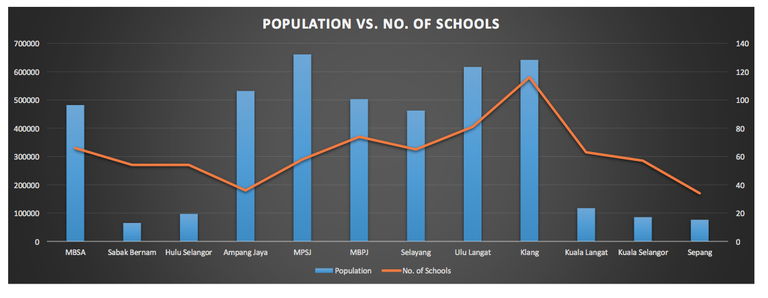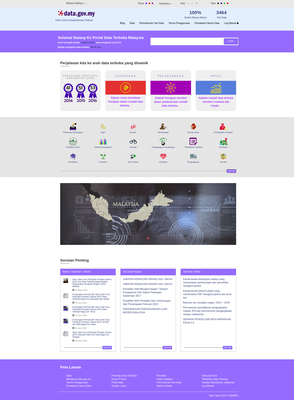
Increasing Open Data Availability for Malaysia
Current state of Open Data in Malaysia and process of opening data under new government
With the new government in place elected partly on platform of better transparency and anti-corruption, there is hope that previously restricted availability of open data will be available soon. There are also questions about how to get involved in this process to speed up the availability of open data such as calls for institutional reform. Unfortunately like many complex problems, the answer is "it depends". There is no single answer or solution. Quality, quantity and when open data will start to be published depends on a variety of factors including institutional capacity and regulatory restrictions.
Current State of Open data in Malaysia
2016 Open Data Barometer report is latest current international measure of the availability and quality of open data for Malaysia. Despite the lack of availability of open data for key categories, on the positive side Malaysia's relatively modern digital government means that the data exists. There is also strong demand for it by both private sector and civil society.

Readiness
Detailed report by World Bank on Malaysia's Open Data Readiness is available online.
It's findings for 8 areas are as follows:
- Senior Leadership: A national open data program exists, and general support for the concept is high. However, increasing open data buyin among data-owning agencies is still a critical issue to be addressed in Malaysia. Stronger sense of purpose for open data as an instrument for impact may yield additional champions.
- Policy and Legal Framework: While data availability is high, access to data is challenging and remains an area of concern among data users in Malaysia. The legal framework is fragmented, and poses an obstacle to more open data as well as to sustained publication. Minor fees charged for data requests are inefficient and act as a further barrier.
- Institutional Structure, Responsibilities and Capabilities within Government: Malaysia is currently implementing an open data program, coordinated by MAMPU.
- Demand for Data: Malaysia is a data-rich environment, but not much highquality data is released in practice. There is little automated inter-agency data exchange, and fees are a hindrance to data users with little benefit to data owners.
- Notable ICT sector and apps exists, however, data journalism is not visible. Co-organized events occur, but more sustained interaction is possible after those events
- There are ongoing open data and big data programs and innovation funding. Acceleration likely lies in connecting existing elements, not increased funding.
- High Internet usage, mostly mobile broadband. Start-up and coding communities active.
So what's needed?
The World Bank concludes that Malaysia requires a high level of national leadership to achieve consensus across government agencies on the scope of legislative, regulatory, and/ or policy changes that need to be made to turn open data into a practical reality and regular occurrence for data users large and small.
Implementation
Internally the government requires coordination in terms of directives, general guidelines and best practices for all agencies to follow. At federal level, the agency responsible is the Malaysian Administrative Modernisation and Management Planning Unit (MAMPU). The circular for open data implementation on what open data is and what government agencies should do, was issued to all agency secretaries back in September 30th 2015. Additionally a government approved Malaysian Government Open Data License has also been published. Since the circular was issued two years ago, it means at this time almost all agencies would have some open data published, along with some mention of it on their respective websites.

Given no other restrictions, these steps means that most agencies have been briefed and have the necessary paperwork to start publishing open data. MAMPU has also set up an open data portal with additional information, as well as central platform for publishing open data at data.gov.my
Data on the government data portal is also organised following Open Data Barometer key categories making it easy for users to find the data they're looking for without needing to find out which agency publishes the data.
Other restrictions
Unfortunately there are other regulations and laws in place that may restrict publication of open data. This varies depending on the type of data and also by agency. Some of these regulations are important. They are there to protect our privacy and also security. For example, we would not want open data published by the health ministry that contains personally identifiable information. Some of these regulations may need be reviewed to allow for more useful open data to be published, while still ensuring privacy and security. This process will take time, requiring set up of committees, expert and public inputs.
Another form of restriction is outdated laws and regulations. Some laws such as mapping data still include pricing by physical dimensions of printed maps. These laws will need to be amended and passed in Parliament.
Additional funding may be required to get a vendor to provide feature to export data in existing system. The need to assign or hire additional staff is another constraint. In the process of demanding open data, we might also uncover poor, failing or unimplemented digital systems such as e-Tanah making some data such as land ownership unavailable without a new system developed.
Working with agencies and elected representatives
Now that we know that agencies in general are ready to share data, what are the other barriers and how can public and civil society participate?
As consumers of data we should evaluate data availability for our field, and provide feedback to the coordinating agency MAMPU and responsible agencies on our needs.
Writing a corresponding public article such as Sinar Project's Open Data Day expedition or report will also help increase awareness for the impact of the use of the data or what data is still lacking to be prioritised.
Civil society also has responsibility in learning about international best practices and standards, to provide better feedback on implementation. If government asks what sort of open data we need for Parliament, we can also do our own groundwork and research. What does the UK Parliament data services provide? What standards does it use and are they applicable for Malaysia? Which data would be a priority for our needs?
In addition to directly contacting agencies, we can also engage with our elected representatives to raise our needs in parliament for the relevant ministers to take action, including amending and updating outdated laws and regulations. Malaysia requires a high level of national leadership, and we will need to keep the pressure on until it gets enough attention for government to take open data seriously and to assign a minister to lead national open data effort.
Malaysia is poised to take the leadership for open government data in this region, let's make it happen.
